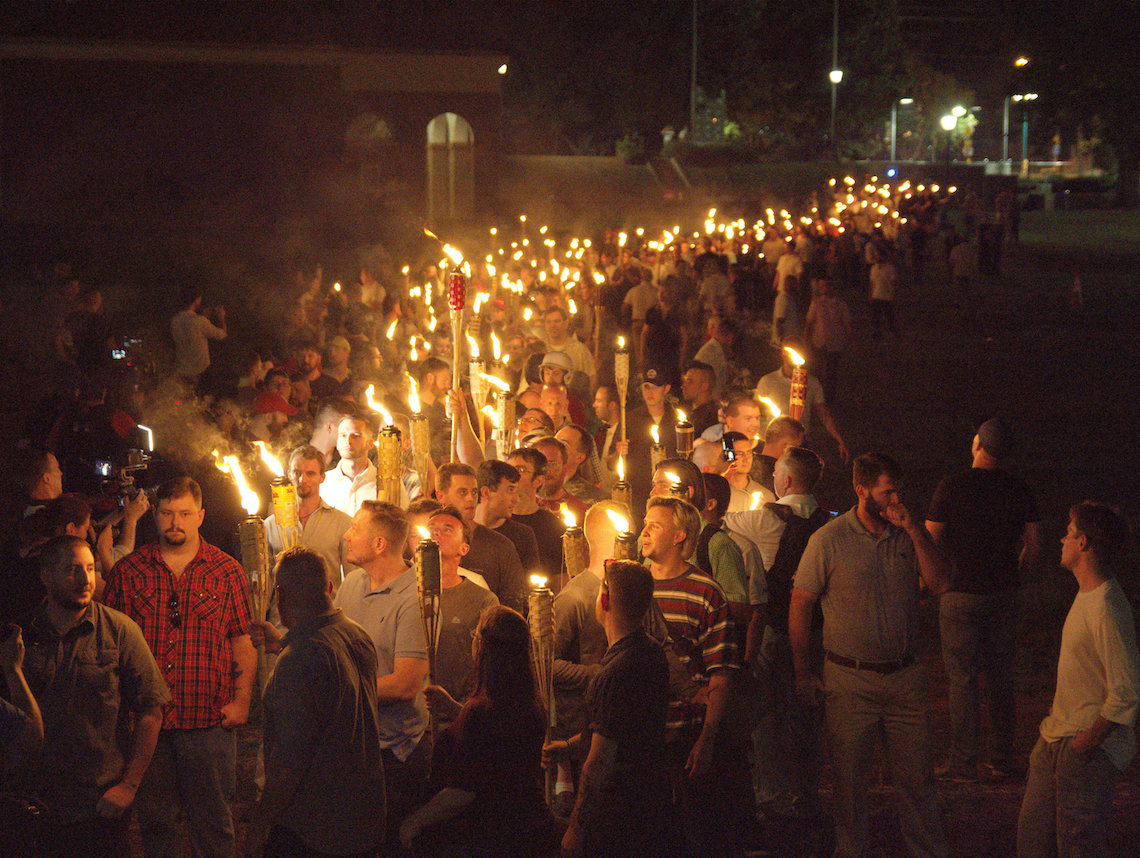 White nationalists carry torches on the grounds of the University of Virginia, on the eve of a planned Unite The Right rally in Charlottesville, Virginia, U.S. August 11, 2017. Picture taken August 11, 2017. Photo by Alejandro Alvarez/News2Share via REUTERS.
White nationalists carry torches on the grounds of the University of Virginia, on the eve of a planned Unite The Right rally in Charlottesville, Virginia, U.S. August 11, 2017. Picture taken August 11, 2017. Photo by Alejandro Alvarez/News2Share via REUTERS. As this Rosh Hashanah neared, I wondered if even a shofar blast could clear away the Charlottesville chant of “Jews won’t replace us” still echoing in my brain. A good, long tekiyah can clear the mind, but this year it seemed the shofar’s piercing sound would not be enough to shatter the growing concerns about anti-Semitism that were keeping me from a more hopeful New Year.
Not that living around people scornful of Jews was anything new. I grew up in the 1960s in Orange County, which had a rock-ribbed chapter of the far-right John Birch Society; The Orange County Register and its editorializing against public schools; and my neighbors and fellow students who told me of their disdain for Jews. What happened in Virginia felt like a return to a place I thought I had left behind.
Still thinking “shofar” as a remedy, I turned to the Rosh Hashanah Torah reading in which a ram’s horn figures prominently: the Akeida, The Binding of Isaac. I hoped that within this dramatic and central story of faith and sacrifice I could find a way not to sacrifice my sense of well-being to the recent emergence of American Sieg Heil-ers.
Reading the parshah did not ease my angst. As you may recall, God puts Abraham to a test by telling him to sacrifice his son Isaac. Abraham and Isaac travel to Mount Moriah, where Isaac is bound and laid on an altar. Abraham, raising a knife, is about to sacrifice his son when a messenger from God stops him. Abraham then sees a ram caught in a thicket by its horns and sacrifices it instead.
I usually have considered the Bible story to have little connection to my everyday life, but now I read it as a cautionary tale. After absorbing weeks of swastikas and arms raised in Nazi salutes, I realized that this year The Binding of Isaac was less about Abraham’s faith being tested and more about my own vulnerability: my being bound to the fear of “it can’t happen here” happening here.
Caught up in my Bible reading, there I was: on a mount, bound up by hate words tightly tying me to a stereotypical image of a Jew. In that scene, a knife of anti-Semitism was hanging over me. Who was wielding it? Not Abraham, more like a guy in khakis and a white polo shirt. Who was being tested? Our “both sides” president, and an array of people who think Jews are too pushy, powerful and in their way. Would an angel’s voice keep the blade from descending? With no unequivocal voice coming from Pennsylvania Avenue, that would depend on public opinion.
Though an Anti-Defamation League (ADL) survey released in April said “the vast majority” of Americans held respectful opinions of their Jewish neighbors, an October 2016 survey revealed the blade was inching downward — that 25 percent of the general population felt “Jews still talk too much about what happened to them in the Holocaust”; 30 percent agreed that “Jews were responsible for the death of Christ”; and 14 percent said that a list of “anti-Semitic propensities — including such statements as “Jews don’t care what happens to anyone but their own kind” and “Jews have a lot of irritating faults” — was “probably true.”
Not at all reassured by these unnerving numbers, I wondered if Jews could reduce them. Though not to be confused with a voice from heaven, the ADL suggests that to free ourselves from hate we learn to recognize its symbols, report hate crimes and “engage in respectful dialogue to build understanding among people with different views.” The ADL also stresses, in the aftermath of acts of hate, how important it is to discuss them with young people.
In the weeks since the tiki torches of Charlottesville, friends and family, even tablemates at Shabbat lunch, have intensely discussed politics and anti-Semitism. Charlottesville has energized us. It’s as if what is called in Yiddish our pintele yid, the Jewish spark at the center of our identities, has been fanned to burn hotter.
Before, many of us didn’t even think or worry about those who might be marching up the mountain, or we didn’t realize that for some of our neighbors and, yes, leaders, Charlottesville was a test. But now in the light of that glow we see it.
In the Akeida, Isaac, not comprehending what is about to transpire, asks his father “where is the sheep for the burnt offering.” Many of us, in a new light of comprehension, now are breaking the bonds of silence, asking our own questions, talking to each other and our neighbors and leaders about anti-Semitism.
It is the sound of that conversation, as clear and sustained as any shofar blast, that we need to hear as we enter the New Year.






















 More news and opinions than at a Shabbat dinner, right in your inbox.
More news and opinions than at a Shabbat dinner, right in your inbox.